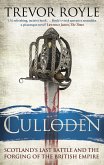The striking saga of the Glorious Revolution is one that continues to fascinate historians around the world today. Some chroniclers have referred to these events as the "Bloodless Revolution," but other historians say otherwise. The ruthless game of politics that William of Orange and England's King James II played may have been somewhat bloodless in comparison to history's greatest rebellions, but the rebels, soldiers, and other pawns who lost their lives along the way must not be forgotten. The revolution would also pave the path for a series of bloody wars between England and Scotland, the result of which has left quite a legacy of its own. Furthermore, it's important to remember that James did try to return to England, and there would be two more years of war before James II gave up the quest to regain the throne. On July 1, 1690, the famous Battle of the Boyne was fought near the town of Drogheda, about five miles west of Baltray. The combatants were the supporters of King James II and King William III, both claiming to be the lawful sovereigns of England, Scotland, and Ireland. The conflict was part of a broader struggle for the destiny of the British Isles, and though it was not the decisive battle of the war, it is the most famous, the commemoration of which still fans tensions between Protestants and Catholics in Northern Ireland and the Republic of Ireland. In its aftermath, James II would again leave the British Isles, this time for good. The Jacobites conjure up many images to 21st century Britons, including romantic heroism, the Outlander series, and Bonnie Prince Charlie as the doomed hero of the cause, but Jacobitism was a cause that had far reaching consequences across 18th century Europe. The Jacobites were not only supporters of the exiled Stuart monarchy, but also against the political and religious settlements agreed to across the British Isles. As Jacobite historians such as Daniel Szechi and Frank McLynn have noted, the specter of the Jacobite threat was present for the British government and monarchy in their dealings with European powers throughout the 18th century. This was especially true in France, the country that supported the exiled Stuarts and gave them a home until 1714. This soured the French monarchy's relationship with Britain, and the Hanoverian kings who replaced the Stuarts were always aware of French and Spanish attempts to return the British throne to the Catholic Stuarts. The Jacobite court in exile regularly issued propaganda detailing the policies they would enact if restored, and this often reflected the agitations of anyone opposed to the political status quo in Britain at any given time. The Jacobites after 1707 in Scotland were often associated with the repeal of the Treaty of Union, mostly as that coincided with popular opinion. Szechi has noted over the years that Jacobitism was politically radical in its objectives, from religious toleration to freely elected Parliaments and curbs on political corruption. The restoration of the Stuarts would also have seen a return to multi-kingdom monarchy in Britain and Ireland, and it would have changed the European alliances which were forged in the many wars fought during this period. Given all that, it's no surprise the Jacobites continue to interest so many people, as do the plot twists, near misses, and "what-ifs" involved. There is always the temptation to consider what may have happened if one small event occurred differently, and how it could have changed history.
Hinweis: Dieser Artikel kann nur an eine deutsche Lieferadresse ausgeliefert werden.
Hinweis: Dieser Artikel kann nur an eine deutsche Lieferadresse ausgeliefert werden.








